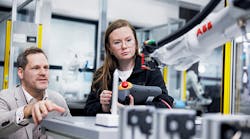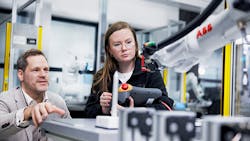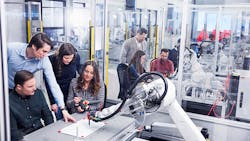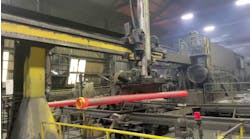Over the next decade, robots and automation will influence the look of employment, according to an overwhelming 80% of education professionals. But only a quarter of educational organizations are using robots in teaching programs, according to a survey from ABB.
Sure, the larger universities boast their super-sized, multiple-disciplined engineering departments with deep resources, but there are enclaves of smaller schools that are providing the skill sets for the next manufacturing wave (Figure 1). Having visited a few of these institutions offering automation-related curricula, from Michigan’s Oakland University to University of Arkansas, Fort Smith, I’ve seen pockets of burgeoning controls and technology.
Also read: Autonomous mobile robots’ value is more than just speed
Investment in robotics and automation are planned by 70% of U.S. and European businesses over the next three years, as indicated in the 2022 ABB Supply Chain Survey, which also revealed a growing trend in U.S. and European businesses toward reshoring or nearshoring operations to build resilience in the face of global challenges. Most important to controls-automation and discrete-manufacturing professionals is a significant education gap identified by the survey in the skills necessary for these strategies to succeed.
A similar survey, the third annual UiPath survey of U.S. business executives in C-level and senior management roles, revealed that 62% of executives are struggling with the current labor shortage, and so 78% of them are likely to invest or increase their investment in automation to manage high turnover rates. As a result, 85% say that incorporating automation and automation training into their organization will help them retain employees and attract new talent, according to the 2022 UiPath survey.
“The world is constantly evolving; businesses are shifting existing structures and adopting new technologies to future-proof their operations for a variety of challenges and uncertainties, with robotic automation playing a key role,” said Sami Atiya, president of ABB’s robotics & discrete automation business, which employs more than 11,000 people in more than 50 countries. “We need significant investment in continuous education to prepare our existing and future workforce to thrive in an age of robotics and automation, important not only to prepare for the widespread shifts we are seeing, but to create prosperous societies going forward.”
Almost three-quarters of European and U.S. businesses are planning to reshore or nearshore operations to build their supply-chain resilience in response to labor shortages, the need for a more sustainable global footprint and global uncertainty, according to the survey.
The majority of these businesses view automation as the enabler of these shifts, with 75% of European and 62% of U.S. businesses planning to invest in robotics and automation in the next three years to facilitate this shift in operations.
Despite this appetite for automation, a significant gap in the education and training that are needed to ensure the skills necessary for work in the increasingly connected and automated workplaces of the future was identified by the ABB survey.
Offering automation training is necessary for companies to keep and hire new talent, too. The UiPath survey indicated that one in three executives cites a lack of skills training as a reason why people leave their jobs. Only 51% of organizations offer automation training, according to this survey. Sixty-three percent offer on-the-job training of automation skills during work hours, while 29% train outside of work, but costs are subsidized by the company. Organizations are expanding access to automation technology to provide employees with automation skill sets, but will training keep pace with implementation?
To strengthen training availability, ABB is adding training centers, including its global innovation and training campus in Austria. The site, along with other regional training centers in the United Kingdom, Germany and Brazil, expands ABB’s training facilities to more than 40 sites globally, educating more than 30,000 students from schools, colleges and universities, as well as apprentices and workers each year.
Through more than 100 global partnerships with schools and universities, ABB generates curriculum materials with education providers to help educate future generations (Figure 2).
Illinois State University (ISU) in Normal, Illinois, is one of those, using ABB robotics and software to train tomorrow’s workforce. The Department of Technology (DoT) at ISU trains students to program and operate industrial robots.
ISU’s partnership with ABB Robotics provides a robust training program in which ISU students graduate with the skills they need to succeed in the future of industry and robotic automation. “One trend that I think we're seeing clearly is an increased demand for our graduates,” said Dr. Kevin Devine, College of Applied Science and Technology professor in the ISU DoT. “The industry is clamoring right now for qualified people, and we're having a lot of trouble meeting that need.”
ISU’s program has attracted students from around the world and re-invigorated the classroom experience through its ABB-supported robot lab and off-line programming tools. “We give our lab the feeling of a training environment to resemble the workplace,” said ISU DoT Professor Jeritt Williams. “We have a work cell with authentic equipment, materials and real-world situations that they'll be using in their careers.”
The lab features an array of ABB robots and software to provide students with the experience and knowledge of Industry 4.0 and smart-manufacturing technologies. One of the tools available is ABB’s RobotStudio off-line programming software, which enables different robotic solutions to be created and simulated in a virtual environment before applying them in the real world. ABB offers up to 100 licenses free of charge to universities and colleges.
“The RobotStudio software product is a powerful learning tool that ABB provides at no cost to educational institutions that use their robots,” said Dr. Devine. “I have my students create and program their robot work cell in a virtual space using RobotStudio, which they can then download and run on real robots.”
The virtual world in RobotStudio reflects what the students are doing in the live environment, explained Williams. “We work with authentic equipment, materials and techniques and apply them to real-world situations that our students will use and encounter in their careers,” said Williams.
ABB’s Software, Maintenance and Robotics Training (SMART) program for STEM certifies educators to implement, teach and certify their students on ABB’s curriculum. The program guides educators through the tool with hands-on examples and interactive labs that boost student engagement and success. The SMART certification program also enables ISU’s staff to access ongoing training and help enhance their own knowledge. “I have attended three training classes conducted by ABB and learned a great deal in each class,” said Dr. Devine.
“Change needs to happen now,” added Atiya. “As companies turn to robotic automation to offset labor shortages, improve efficiency and increase resilience, workers need the skillsets to use automation to perform their jobs and augment their own roles. Businesses need to join forces, cooperating with education institutions and governments to ensure that society is prepared for jobs of the future. Only through this can we fully utilize flexible automation and unlock value from the ongoing re-industrialization.”







